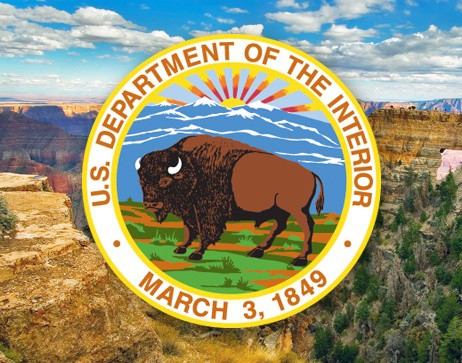Todd Wynn, operative for electric utilities and climate denier, the latest industry hire at Department of the Interior

The Trump Administration has added another operative from the electric utility industry with a record of climate change denial to its rolls.
The Department of Interior hired Todd Wynn as its Director of the Office of Intergovernmental and External Affairs. DeSmog Blog first reported the hire.
Wynn had most recently been employed by the Edison Electric Institute (EEI), the trade association for the nation’s investor-owned electric utilities, and before that by the American Legislative Exchange Council (ALEC), a group which brings corporate lobbyists and state legislators together to formulate industry-friendly legislation. In 2011, Wynn claimed in a film that he produced that “I think that global warming could be a net benefit for the planet.”
Wynn had been responsible for managing EEI’s outreach to third-party organizations, mostly operating at the state level, some of which EEI supported with large contributions and sponsorships. He leveraged those relationships to advocate for EEI’s agenda, which in recent years included attacks on state rooftop solar policies.
Wynn was recorded a year ago pleading with the State Policy Network (SPN) to “get involved” in advocating with Public Utility Commissions (PUCs) in support of policy changes that would kill rooftop solar growth and tax consumers.
UtilitySecrets.org obtained the audio recording, which captures Wynn speaking at the “Energy/Environment Leadership Summit,” on October 2, 2016 in Nashville, TN. The summit is an annual event organized by the Thomas Jefferson Institute for Public Policy that takes place alongside the SPN annual meeting. SPN is a web of right-wing, state-based think tanks around the country which claim to push for “market-oriented solutions” but whose agenda often reflects the interests of its donors, which includes utilities.
Wynn specifically called on the SPN think tanks to advocate at PUCs on behalf of higher fixed charges. Increasing fixed charges would hike the portion of a customer’s electricity bill that they pay no matter how much electricity they use. Fixed charges tend to increase bills for low energy users, and decrease bills for high energy users, meaning they hit the poorest customers hardest. The charges also make rooftop solar less valuable, which is one reason that EEI’s Wynn was pushing the SPN groups to back the charges.
Wynn also advised state legislators while at EEI on the best way to attack President Obama’s Clean Power Plan in the summer of 2015, according to the Washington Post. Speaking at an ALEC conference that July, Wynn told legislators they should “begin taking steps to comply with the regulation, even as they pursued lawsuits to block it:
‘Our folks think that submitting a [compliance] plan is a good way to go for a couple of reasons,’ Wynn said. ‘For one thing, it doesn’t ruin your standing as far as litigation is concerned.’”
In 2014, Wynn spoke at the winter “policy summit” of the American City County Exchange, which is an offshoot of ALEC that targets city and county government officials. According to Steve Arnold, an alderman from Fitchburg, Wisconsin who attended, Wynn “briefed us on two initiatives that EEI’s member utilities consider threats: net metering of green energy and municipalization of distribution systems.”
Arnold also reported, “Wynn was explicit in describing how a local elected official’s relationship with a utility company can be a ‘you scratch my back, I’ll scratch yours’ situation.”
Wynn told the public officials,
“Engage and get to know your local electric utility. Those guys are really great … They can be awesome assets for you. They can help you out with your races at some point in time as well, which is always positive.”
Wynn’s history positions him to do industry’s bidding at DOI
Prior to his joining EEI in 2013, Wynn worked for two years at the American Legislative Exchange Council (ALEC), as the organization’s director of the task force on Energy, Environment and Agriculture. ALEC is a “bill mill” which allows companies to push industry-friendly model legislation to conservative lawmakers. During Wynn’s time at ALEC, the task force passed several pieces of model legislation that would be relevant to Department of Interior, including:
- A resolution urging the Federal Government to sell public lands and use the debt to pay down the national debt;
- A resolution “on sustainable resource development” that “supports continued jurisdiction of the States to appropriately regulate oil and gas production in their unique geological and geographical circumstances.”
- A “Resolution Requesting that the Obama Administration Confer and Consult with the States on Management of Public Lands and Energy Resources”
Other resolutions attacked state renewable portfolio standards and efforts to reduce carbon pollution.
Trump’s Interior Secretary, Ryan Zinke, has delayed rules to reduce the leaking, venting and flaring of methane on public lands; methane is a super-potent climate pollutant. The Washington Post reported that Zinke would shrink at least four national monuments, and modify a half dozen others to permit grazing, logging, coal mining and commercial fishing.
Wynn’s long history working with polluting industries and right-wing groups makes him a natural conduit between those groups and DOI. He is part of a pattern of DOI staffing positions with veterans of the fossil fuel industry. Deputy Interior Administrator David Bernhardt, for example, spent years lobbying for oil and gas companies, private water companies, and large agribusinesses before being confirmed on partisan lines by the Senate.
Wynn will also not be the only EEI alumnus to find a home in the Trump Administration. Brian McCormack, Wynn’s former boss and the VP of External Affairs at EEI, got a job as Rick Perry’s Chief of Staff at the Department of Energy.
Wynn has a track record of climate science denial
Wynn was a frequent denier of climate change science in his previous job at the Cascade Policy Institute.
He wrote in 2009 that the earth was “currently cooling” and that global temperatures had declined over the past seven years. Both claims are false.
In 2011, he produced a film, called “Climate Chains” which aimed to “raise awareness of the costs and implications of policies based on global warming alarmism by conducting a multi-faceted campaign to peel away grassroots political support for carbon restrictions.” It was funded by the Competitive Enterprise Institute, American Enterprise Institute, and Heritage Foundation, and featured noted deniers like Myron Ebell and Chris Horner claiming that the earth was cooling, or that global temperature increases, were they to happen, would be beneficial.
In the film, Wynn said: “we also have to look at the benefits of higher global temperatures … I think that global warming could be a net benefit for the planet.”
Wynn’s position with DOI will not require confirmation by the Senate.



